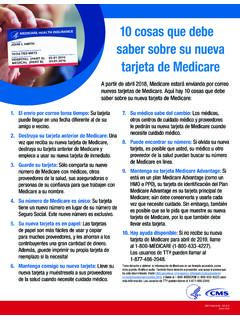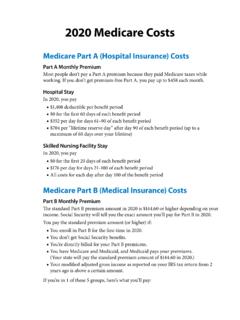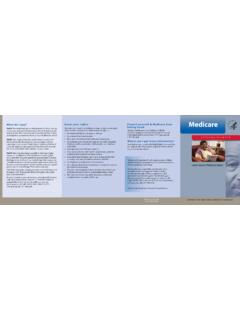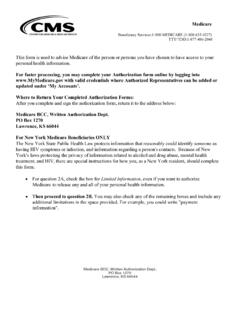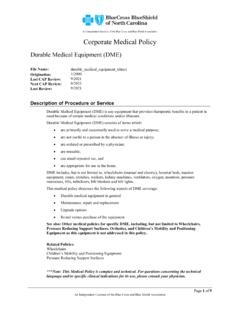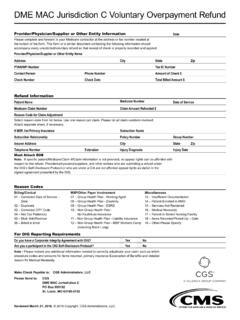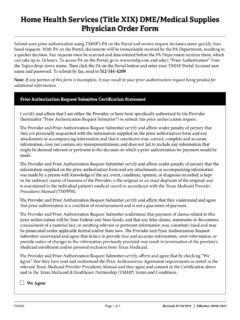Transcription of Medicare and clinical research studies.
1 CENTERS FOR Medicare & MEDICAID SERVICES. Medicare & clinical research Studies What are clinical research studies? clinical research studies (also called clinical trials) help doctors and researchers test how well different types of medical care work and if they're safe. You may have the choice to join a clinical research study to diagnose or treat an illness. Medicare covers certain clinical research studies and may help pay for some of your costs if you join a study. Should I join a clinical research study? Before you decide to join a study, consider both the benefits and risks that might be involved. Benefits may include: Getting specialized health care Getting access to new drugs and treatments before they're widely available Having health professionals monitor your health care closely for any side effects Taking a more active role in your own health care Making an important contribution to research that may help others with the same illness Risks may include: Experiencing side effects from new drugs and treatments your doctors may not know about Getting drugs and treatments that aren't effective, or less effective, than current approaches Not benefiting from a drug or treatment that may benefit others, or being in the placebo group (see the next page for more information on placebos).
2 Studies may require a lot of your time and frequent trips to the study site 2. What happens if I decide to join a clinical research study? You'll have a chance to ask questions about the study before you decide to join. Make sure you understand and are comfortable with what will happen during the study. Once you've been told all the details of the study, if you decide you want to join, you'll be asked to sign an informed consent form. The informed consent form is NOT a contract. Your participation in a clinical research study is always voluntary, and you may leave the study at any time and for any reason. You can ask any questions or bring up any issues you have about the study at any time . The study must keep your health and personal information private. 3. What's a placebo, and will I get one? A placebo is an inactive substance (like a sugar pill) or treatment that looks the same as, and is given the same way as, an active drug or treatment being tested in a clinical research study.
3 Many clinical research studies compare a new treatment for an illness with an existing treatment for the illness. In some of these studies, patients are randomly put in one group or another. If there isn't an existing treatment, the study may compare a new treatment with a placebo to find out if the new treatment has any effect on the illness being studied. You'll be told if you might be given a placebo before you decide whether to take part in the study. Once you're in the study, you won't know if you're taking the placebo or the treatment that's being tested. Will I have to pay for any part of the clinical research study? Original Medicare (Part A and/or Part B) pays for routine costs of items and services in certain covered clinical research studies. Examples of these items and services include: Room and board for a hospital stay that Medicare would pay for even if you weren't in a study An operation to implant an item that's being tested Treatment of side effects and complications that may occur as a result of the study 4.
4 Will I have to pay for any part of the clinical research study? (continued). Original Medicare won't pay for: The new item or service that the study is testing unless Medicare would cover the item or service even if you weren't in a study Items and services the study gives for free (many times the treatment will be provided free by the study sponsor). Items or services used only to collect data and not used in your direct health care (like monthly EKGs for a condition that usually requires only a yearly EKG). If you're concerned about paying for services Medicare won't cover, talk to the study staff and see if they can help. I'm in a Medicare health plan. Can I still be in a clinical research study? Yes. If you're in a Medicare Advantage Plan (like an HMO. or PPO) or other Medicare health plan, you can get the same coverage for clinical research studies as a person in Original Medicare , as described in the previous section.
5 If you join certain covered clinical research studies, Medicare will pay for your covered services as if you were in Original Medicare . This means that your Medicare health plan can't keep you from joining a clinical research study. However, you should tell your plan before you start a study. 5. Will my employer group health plan cover the costs in a clinical research study? Whether your employer plan covers all or some of the costs depends on: The rules of your employer plan Whether the employer plan or Medicare pays your bills first Before you join a study, check with your employer plan or your benefits administrator to find out what's covered. For more information on who should pay first, visit Medicare . gov/supplements-other-insurance/how-medi care-works- with-other-insurance/which-insurance-pay s-first. You can also call 1-800- Medicare (1 800 633-4227).
6 TTY users can call 1-877-486-2048. Will my Medicare Supplement Insurance (Medigap) policy pay for my costs if I'm in a clinical research study? If Medicare covers the routine costs of your study, your Medigap policy must pay the same as it would for any other Medicare -covered services. There can be cases where a clinical research study includes some services Medicare covers and some services Medicare doesn't cover. In these cases, Medigap will generally only pay for the services Medicare covers. Contact the insurance company that provides your Medigap policy for more information. 6. I'm in a Medicare drug plan. If I join a clinical research study that's testing a prescription drug, will my plan cover the cost of the drug? Your plan may or may not cover the cost of the drug. Contact your plan for more information. Where can I get more information?
7 To find out more about clinical research studies: Talk to your doctor. Visit This website is run by the National Library of Medicine (NLM) at the National Institutes of Health (NIH), and it lists government and private studies across the country. It also has more information to help you understand clinical research studies. If you don't have a computer, your local library or senior center may be able to help you find this information. 7. You have the right to get Medicare information in an accessible format, like large print, Braille, or audio. You also have the right to file a complaint if you feel you've been discriminated against. Visit , or call 1-800- Medicare (1-800-633-4227) for more information. TTY users can call 1-877-486-2048. Paid for by the Department of Health & Human Services. CMS Product No. 02226. Revised September 2019.
